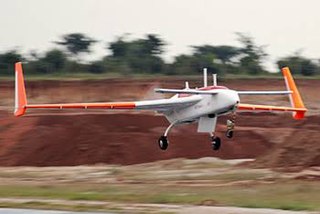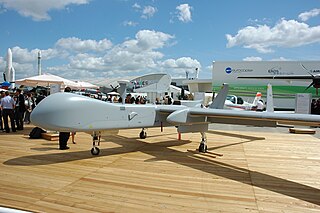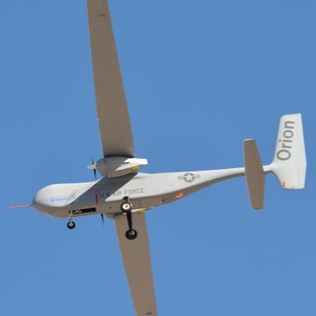Related Research Articles

The Northrop Grumman RQ-4 Global Hawk is a high-altitude, remotely-piloted surveillance aircraft introduced in 2001. It was initially designed by Ryan Aeronautical, and known as Tier II+ during development. The RQ-4 provides a broad overview and systematic surveillance using high-resolution synthetic aperture radar (SAR) and electro-optical/infrared (EO/IR) sensors with long loiter times over target areas.

Surveillance aircraft are aircraft used for surveillance. They are primarily operated by military forces and government agencies in roles including intelligence gathering, maritime patrol, battlefield and airspace surveillance, observation, and law enforcement.

An aerobot is an aerial robot, usually used in the context of an uncrewed space probe or unmanned aerial vehicle.

The Sikorsky Cypher and Cypher II are types of unmanned aerial vehicles developed by Sikorsky Aircraft. They are vertical takeoff and landing aircraft which use two opposing rotors enclosed in a circular shroud for propulsion.

A miniature UAV, small UAV (SUAV), or drone is an unmanned aerial vehicle small enough to be man-portable. Smallest UAVs are called micro air vehicle.

The Environmental Research Aircraft and Sensor Technology, or ERAST program was a NASA program to develop cost-effective, slow-flying unmanned aerial vehicles (UAVs) that could perform long-duration science missions at altitudes above 60,000 ft (18,000 m). The project included a number of technology development programs conducted by the joint NASA-industry ERAST Alliance. The project was formally terminated in 2003.

The BAI Aerosystems (BAIA) BQM-147 Dragon unmanned aerial vehicle is a tactical battlefield UAV operated by the United States Marine Corps. Originally designed as an expendable communication jammers, they were converted into a reconnaissance role with the addition of a camera.

The Northrop Grumman Bat is a medium-altitude unmanned air vehicle originally developed for use by the United States Armed Forces. Designed primarily as an intelligence "ISR" gathering tool, the Bat features 30 lb (14 kg) payload capacity and a 10 ft (3.0 m) wing span.

The General Atomics MQ-1C Gray Eagle is a medium-altitude, long-endurance (MALE) unmanned aircraft system (UAS). It was developed by General Atomics Aeronautical Systems (GA-ASI) for the United States Army as an upgrade of the General Atomics MQ-1 Predator.

The Zephyr is a series of high-altitude platform station aircraft produced by Airbus. They were designed originally by QinetiQ, a commercial offshoot of the UK Ministry of Defence. In July 2010, the Zephyr 7 flew for 14 days. In March 2013, the project was sold to Airbus Defence and Space. In the summer of 2022, the Zephyr 8/S flew for 64 days.

The BAE Systems HERTI is an unmanned aerial vehicle (UAV) developed by the British company BAE Systems. HERTI stands for "High Endurance Rapid Technology Insertion" and was developed in Warton, United Kingdom. The HERTI airframe is based on the J-6 Fregata motor glider designed by Jaroslaw Janowski of J&AS Aero Design in Poland. Its first flight was in December 2004 at the Australian Woomera test range where much of the test flight programme has been undertaken. HERTI was also the first UAV to fly in the UK with the flight being certified by the Civil Aviation Authority.
The CAC Fox is a small UAV developed in France for use as a reconnaissance aircraft and for electronic warfare. About a thousand have been sold in a number of variants, with generally similar appearance and specifications.

The DRDO Rustom is a family of medium-altitude long-endurance (MALE) unmanned air vehicle (UAV) being developed by the Defence Research and Development Organisation (DRDO) for the three services, Indian Army, Indian Navy and the Indian Air Force, of the Indian Armed Forces. Rustom is derived from the NAL's LCRA developed by a team under the leadership of late Professor Rustom Damania in the 1980s. The UAV will have structural changes and a new engine.

A high-altitude platform station, also known as atmospheric satellite, is a long endurance, high altitude aircraft able to offer observation or communication services similarly to artificial satellites. Mostly unmanned aerial vehicles (UAVs), they remain aloft through atmospheric lift, either aerodynamic like airplanes, or aerostatic like airships or balloons. High-altitude long endurance (HALE) military drones can fly above 60,000 ft over 32 hours, while civil HAPS are radio stations at an altitude of 20 to 50 km above waypoints, for weeks.

The EADS Harfang, formerly known as Système intérimaire de drone MALE is an unmanned aerial vehicle used by the French Air Force, supplementing the RQ-5 Hunter.

The Hybrid Air Vehicles Airlander 10 is a hybrid airship designed and built by British manufacturer Hybrid Air Vehicles (HAV). Comprising a helium airship with auxiliary wing and tail surfaces, it flies using both aerostatic and aerodynamic lift and is powered by four diesel engine-driven ducted propellers.

The Israel Aerospace Industries Panther is a tilt-rotor unmanned aerial vehicle (UAV) produced by Israel Aircraft Industries in Israel.

The Tactical Robotics Cormorant, formerly AirMule or Mule, Israel Defense Forces (IDF) codename Pereira, is a flying car unmanned aerial vehicle (UAV) built by Tactical Robotics Ltd., a subsidiary of designer Rafi Yoeli's Urban Aeronautics Ltd., in Yavne, Israel. It will be used in search and rescue operations where it is too dangerous or inaccessible for a helicopter, such as evacuating people from the upper stories of burning buildings, or delivering and extracting police and soldiers while very close to structures, narrow streets, or through holes into confined spaces.

The Orion is a Medium-altitude long-endurance unmanned aerial vehicle (UAV) developed by Aurora Flight Sciences.

The Shahpar-ll is an unmanned combat aerial vehicle (UCAV) built by Global Industrial Defence Solutions of Pakistan. It is currently in production following the completion of a test and qualification phase.
References
- ↑ Govers, Francis X. III (2013-06-11). "Nevada company launches silent Sky Sentinel UAV airship". gizmag.com. Retrieved 2014-08-16.
- ↑ "Sky Sentinel 2". Airship Manufacturing. Retrieved 2014-08-16.